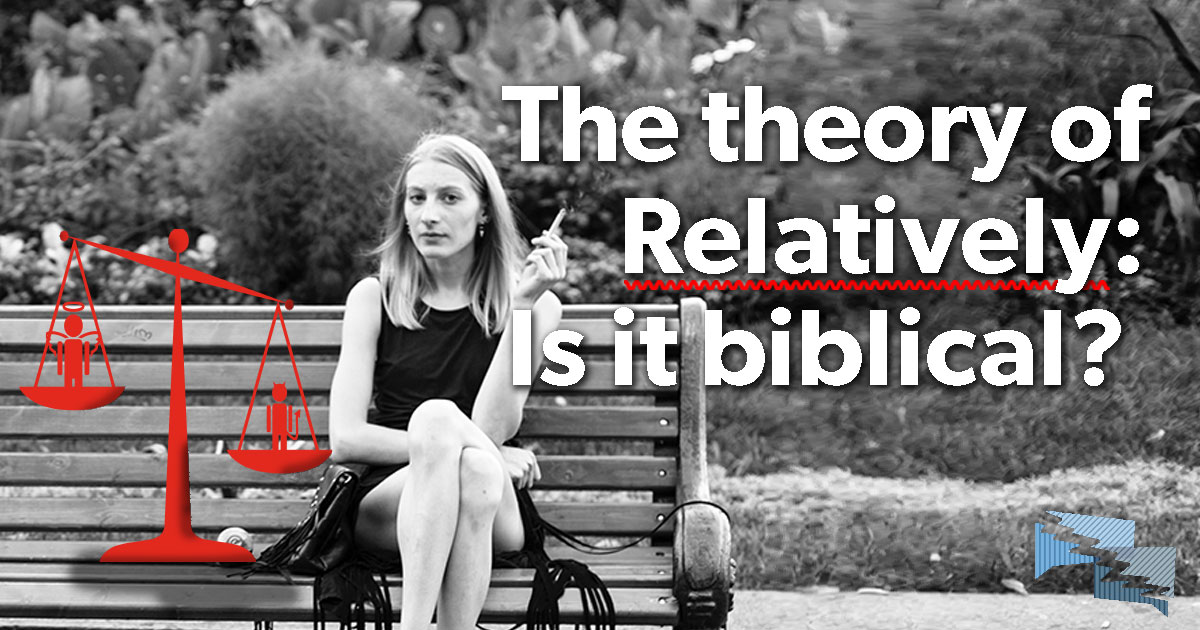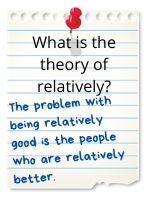
What is the theory of relatively?
Most religions throughout history have taught that after death people go on to another place, often either a place of torment or paradise. Different religions present different requirements for going to heaven. The vast majority of these include either specific works or a general goodness of character.
Religions which provide a list of requirements are fairly simple. "Keep every single law we give you from your infancy to your death" is an easy concept to grasp. But religions with more nebulous requirements, like "be a good person," can cause rather a lot of stress. Parishioners quickly descend from the heights of inspiration ("I can do it!") to the depths of the theory of relatively.
The theory of relatively, not to be confused with Einstein's theory of relativity but rather, in regard to earning eternity in paradise, assumes that there are different levels of goodness and one must reach a certain standard in order to reach heaven, nirvana, or whatever noodley-goodness Pastafarians look forward to. "Good" becomes relative, and people learn to judge their own actions based on a comparison with others:
• I drove twenty miles over the speed limit, but she crashed into a school bus.
• I stole a diamond necklace and three packs of cigarettes, but he embezzled a million dollars from a church.
• I spray-painted racist symbols on the overpass, but she set fire to an orphanage.
• I set off a nuclear suitcase bomb, but I'm not Hitler.
As you can see, with the theory of relatively, one can justify any sin just by comparing it to something worse. This is in direct contradiction to Christianity which teaches it is impossible to be good enough to get to heaven.
Religions which provide a list of requirements are fairly simple. "Keep every single law we give you from your infancy to your death" is an easy concept to grasp. But religions with more nebulous requirements, like "be a good person," can cause rather a lot of stress. Parishioners quickly descend from the heights of inspiration ("I can do it!") to the depths of the theory of relatively.
The theory of relatively, not to be confused with Einstein's theory of relativity but rather, in regard to earning eternity in paradise, assumes that there are different levels of goodness and one must reach a certain standard in order to reach heaven, nirvana, or whatever noodley-goodness Pastafarians look forward to. "Good" becomes relative, and people learn to judge their own actions based on a comparison with others:
• I drove twenty miles over the speed limit, but she crashed into a school bus.
• I stole a diamond necklace and three packs of cigarettes, but he embezzled a million dollars from a church.
• I spray-painted racist symbols on the overpass, but she set fire to an orphanage.
• I set off a nuclear suitcase bomb, but I'm not Hitler.
As you can see, with the theory of relatively, one can justify any sin just by comparing it to something worse. This is in direct contradiction to Christianity which teaches it is impossible to be good enough to get to heaven.
This is what WOULD happen if GotQuestions.org genuinely, honestly answered all the mis-typed, autocorrected, or otherwise altered "spiritual" questions that come their way every day.
HOME | ABOUT | CATEGORIES | CONTACT | THE REAL SITE
© 2024 Got Questions Ministries. All rights reserved.

